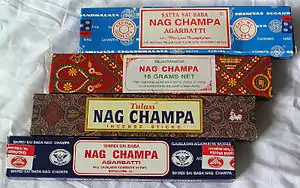Nag champa
Nag champa is a fragrance of Indian origin. It is made from a combination of sandalwood and either champak[1][2] or frangipani.[3] When frangipani is used, the fragrance is usually referred to simply as champa.[4]

Nag champa is commonly used in incense, soap, perfume oil, essential oils, candles, wax melts, and personal toiletries.[5] It is a popular and recognizable incense fragrance.[6][4]
Composition
A number of flower species in India are known as champa or champak:[7]
- Magnolia champaca, formerly classified as Michelia champaca (swarna champa or yellow champa)
- Plumeria rubra (frangipani)
- Mesua ferrea (nagkeshar or nagchampa)
Of these—Magnolia champaca,[6][8] is mostly used to prepare the nag champa scent, while Plumeria[9] or Mesua ferrea[7] may be used for scents termed champa and sometimes nag champa.
Nag champa perfume ingredients vary with the manufacturer, though generally they include sandalwood and magnolia,[1] which, as the plant is related to star anise, gives the scent a little spice. Other ingredients will depend on the finished product. Perfume-dipped incenses and soaps would use essential oils or scents, while masala incenses would use finely ground fragrant ingredients as well as essential oils.[5]
References
- Stephanie Rose Bird (2006). Four Seasons of Mojo: An Herbal Guide to Natural Living. Llewellyn Worldwide. p. 67. ISBN 9780738706283.
- Margaret Ann Lembo (2006). The Essential Guide to Aromatherapy and Vibrational Healing. Llewellyn Worldwide. p. 41. ISBN 9780738747781.
- Tomás Prower (1 Oct 2015). La Santa Muerte. Llewellyn Worldwide. p. 99. ISBN 9780738745510.
- Alaric Albertsson (8 Nov 2013). To Walk a Pagan Path. Llewellyn Worldwide. p. 232. ISBN 9780738739229.
- Som Nath Mahindru (1992). Indian plant perfumes. Metropolitan. p. 107.
- Natural Scents. "Nag Champa Ingredients".
- Robert Beer (1999). The Encyclopedia of Tibetan Symbols and Motifs. Serindia. p. 50. ISBN 9780906026489.
- Stephanie Rose Bird (2006). Four Seasons of Mojo: An Herbal Guide to Natural Living. Llewellyn. p. 67. ISBN 978-0-7387-0628-3.
- Tess Whitehurst (2013). The Magic of Flowers: A Guide to Their Metaphysical Uses & Properties. Llewellyn Worldwide. pp. 295–. ISBN 978-0-7387-3194-0.
External links
 Media related to Nag Champa at Wikimedia Commons
Media related to Nag Champa at Wikimedia Commons